
Have you ever dreamed of an overseas physician job? Of combining your clinical skills with a once-in-a-lifetime adventure? If so, an international locum tenens assignment in New Zealand might be your perfect opportunity. With its dramatic landscapes, welcoming communities, and well-respected public healthcare system, New Zealand offers more than just a change of scenery — it offers a fresh perspective on your work and your life.
But how do you actually get there? Here’s what you need to know to prepare for your international physician job in New Zealand, from contracts and paperwork to pets, packing, and beyond.
How long do assignments in New Zealand last?
Most locum tenens assignments in New Zealand last 6 to 12 months, with many facilities strongly preferring 12 months. Getting licensed and relocated takes time, and facilities value the continuity of care that comes with a longer commitment.
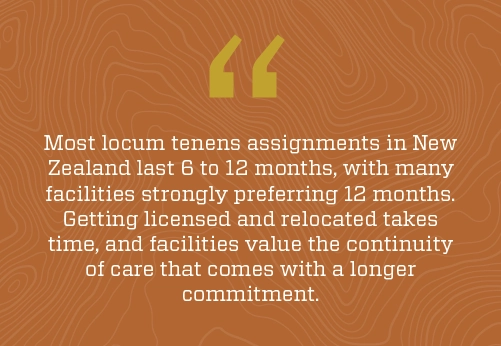
Physicians often report that six months goes by fast — just as you’re settling into the practice and the community, it’s time to leave. A whole year gives you more time to integrate, explore, and truly make the most of the experience.
That said, shorter assignments do come up, so don’t hesitate to explore your options, even if you’re not ready to commit to a full year.
What’s included in the contract?
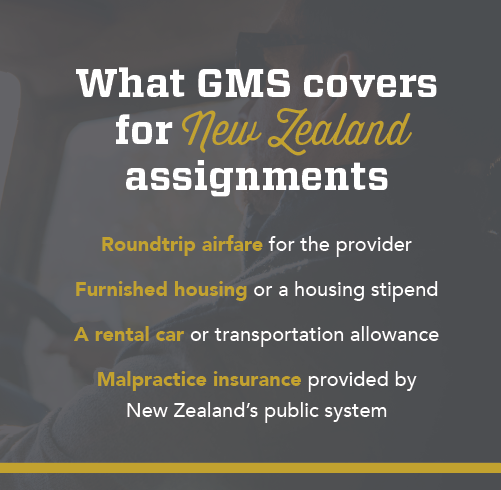
Your contract typically covers more than just your pay. Most locum assignments in New Zealand come with:
- Roundtrip airfare for the provider
- Furnished housing or a housing stipend
- A rental car or transportation allowance
- Malpractice insurance provided by New Zealand’s public system
Other support services, such as licensing assistance and relocation coordination, may also be included when working with an agency.
When to start the process for international locum tenens
Timing is everything. Ideally, you should start the process at least six to nine months before your intended departure. That may sound early, but international credentialing, registration with the Medical Council of New Zealand (MCNZ), and securing the appropriate visa all take time and can’t be rushed.
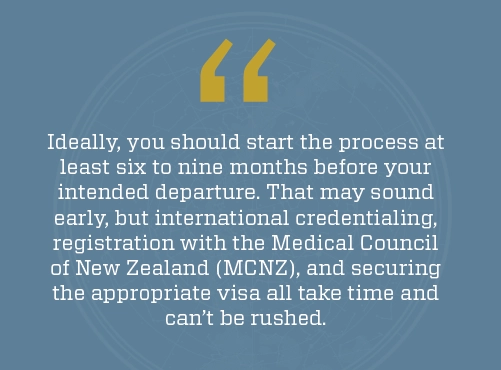
Starting early also gives you time to find the right fit, complete the necessary paperwork, plan your move, and involve your family if they’re coming with you.
How does the pay compare?
Don’t expect to earn U.S. locum rates — but don’t expect to pay U.S. prices, either. Salaries in New Zealand are lower than in the U.S., but the cost of living, especially for housing and healthcare, is often lower as well. And many expenses — like lodging and travel — are covered. Most physicians report they earn enough to live comfortably and travel frequently during their assignment.
For many, the real value is the experience: a better work-life balance, reduced administrative burden, and the chance to explore one of the most beautiful countries on Earth.
Pay for international physician jobs: How much locum tenens physicians get paid in other countries
Finding the right assignment
Working with a locum tenens agency specializing in international locum tenens placements — particularly New Zealand — can help you determine which locations are open to international physicians and which specialties are most in demand.
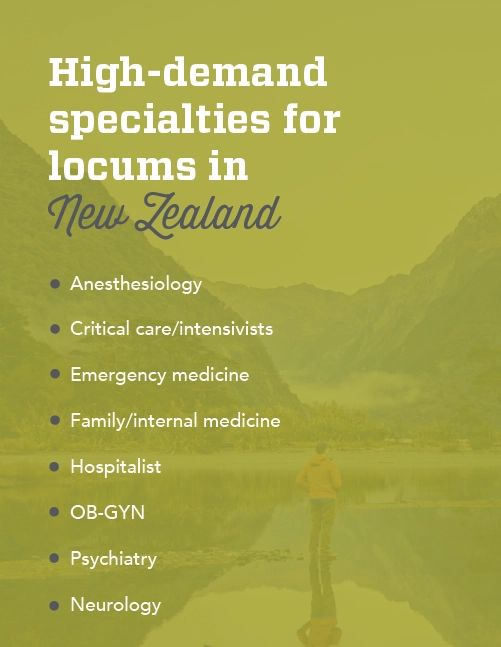
High-demand specialties often include:
- Anesthesiology
- Critical Care/Intensivists
- Emergency Medicine
- Family Practice/Internal Medicine
- Hospitalist
- OB-GYN
- Psychiatry
- Neurology
The interview process
The interview process is typically casual and conversational and often conducted over Zoom. You’ll speak with clinical leaders or hospital administrators to assess mutual fit, learn about the practice setting, and discuss expectations. It’s also your chance to ask about scheduling, patient load, support staff, and call requirements.
Paperwork and credentialing
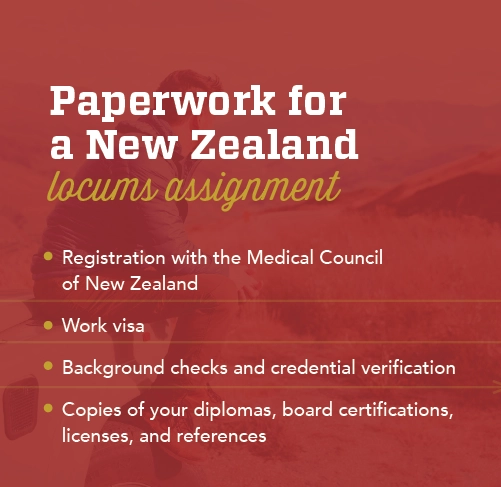
There’s a lot of paperwork — but your Global Medical Staffing will help. In general, you’ll need:
- Registration with the Medical Council of New Zealand (MCNZ)
- Work visa (typically the Accredited Employer Work Visa)
- Background checks and credential verification
- Copies of your diplomas, board certifications, licenses, and references
Your agency will typically support the logistics of credentialing and immigration, walking you through each step and helping manage the timeline.
Traveling with a family
One of the most common questions providers ask is: Can I bring my family? The answer is yes, and for many, having loved ones along makes the long assignment more fulfilling.
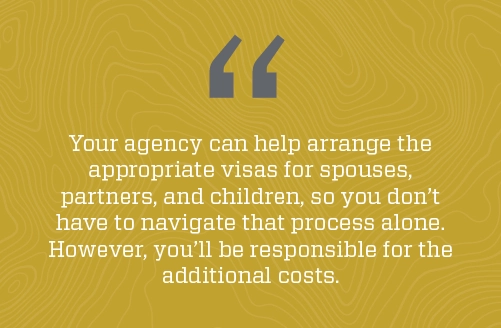
Your agency can help arrange the appropriate visas for spouses, partners, and children, so you don’t have to navigate that process alone. Depending on assignment length and current regulations, the specifics vary, but your recruiter will walk you through every step.
Spouses can work, too, especially on assignments longer than six months. In those cases, they may qualify to work under your visa. For shorter assignments, they may need to secure a job first before applying for a work visa from within New Zealand.
If you’re bringing children, schooling is very manageable. New Zealand offers excellent public schools (which are free) as well as private options. The school year is different, running from late January through early December. While the transition requires some planning, many families report that their kids thrive in the new environment, building confidence and making friends quickly.
Know before you go: Where do I stay on a locum tenens assignment?
What about pets?
Yes, you can bring your pets to New Zealand — but it takes planning. Dogs and cats have made the trip, but the process can be time-consuming and costly, and will not likely be covered by your employer or agency.
Many providers opt to leave their pets with family or friends, especially if they’re older or have health issues that could make the travel challenging.
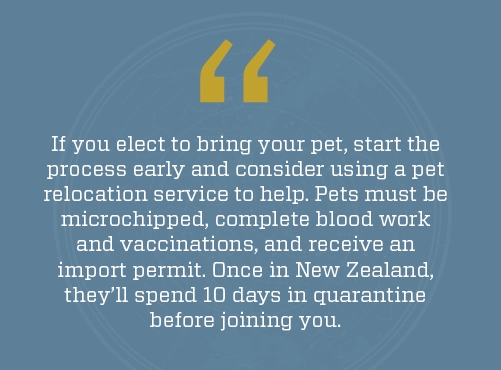
If you elect to bring your pet, start the process early and consider using a pet relocation service to help. Pets must be microchipped, complete blood work and vaccinations, and receive an import permit. Once in New Zealand, they’ll spend 10 days in quarantine before joining you.
What to do with your house
If you own your home, you’ll need to decide whether to rent it, have someone house-sit, or leave it vacant. If you choose to rent, consider hiring a property management company — it can help reduce your stress from abroad.
If you’re a renter, check your lease for sublet or early termination options.
Housing and transportation
Generally, housing is provided as part of the contract, though this can vary depending on the location. If housing is provided, it will be furnished and ready upon arrival. Housing is typically close to your place of work, and in some cases, it may even be within walking distance.
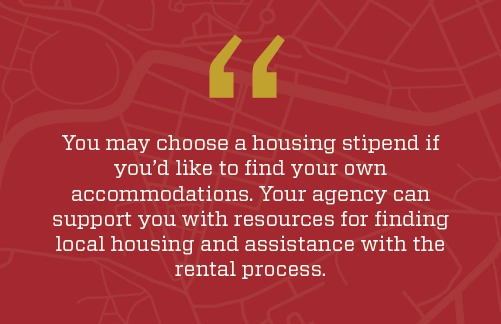
You may choose a housing stipend if you’d like to find your own accommodation. Your agency can support you with resources for finding local housing and assistance with the rental process.
Your assignment may also include a car. If not, many people opt for a long-term rental from a car agency, while others choose to buy a car when they arrive, especially if they’ll be staying for an extended period. Purchasing a vehicle can be a practical solution, as you can sell it when your assignment ends.
Be prepared: Everything you need to know about locums housing in New Zealand
Cell phones and staying connected
You can bring your U.S. phone and get a local SIM card from a New Zealand provider. Be sure your phone is unlocked before you go. Alternatively, you can get a local phone upon arrival.
If your position requires you to be on call, the facility will typically provide a phone for you.
How to pack
When it comes to packing for your New Zealand locum tenens assignment, keep it simple. Most facilities will cover two checked bags per traveler, and that’s usually all you need. Think light and essential — clothing, personal items, and anything you can’t live without.
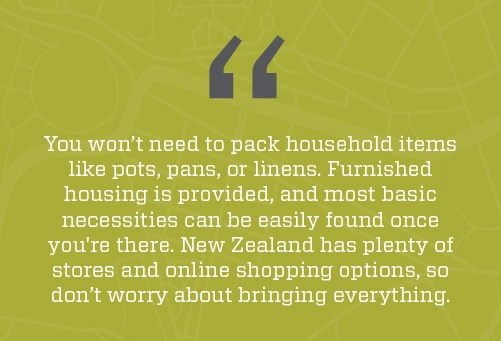
You won’t need to pack household items like pots, pans, or linens. Furnished housing is provided, and most basic necessities can be easily found once you’re there. New Zealand has plenty of stores and online shopping options, so don’t worry about bringing everything.
Health and other insurance
In New Zealand, you’ll be covered for accidental injuries through the country’s healthcare system. However, anything that’s not considered accidental (like non-urgent or pre-existing conditions) will require private insurance.
While private insurance isn’t mandatory, ensuring comprehensive coverage is recommended. Without it, you’ll have to pay out-of-pocket for non-accidental medical expenses.
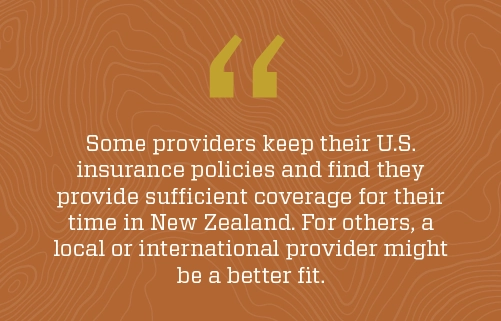
Some providers keep their U.S. insurance policies and find they provide sufficient coverage for their time in New Zealand. For others, a local or international provider might be a better fit.
Banking and taxes
You’ll need to open a local bank account, and you’ll want it set up as quickly as possible once you arrive.
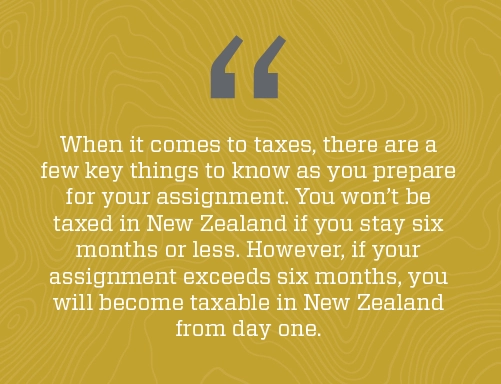
When it comes to taxes, there are a few key things to know as you prepare for your assignment. You won’t be taxed in New Zealand if you stay six months or less. However, if your assignment exceeds six months, you will become taxable in New Zealand from day one. In this case, your agency should handle the withholding of taxes from your paycheck and report them to the New Zealand government.
Regardless of whether you’re taxable in New Zealand, you’ll still be required to file taxes in the U.S. Given the complexity, it’s wise to engage a tax professional with experience in international tax law. They can help you navigate the differences, offer advice on filing deadlines, and let you know if you’re eligible for any credits or deductions.
Physician’s perspective: What I wish I’d know before departing for my assignment in New Zealand
Before you go
A locum tenens assignment in New Zealand is more than just a job — it’s a professional and personal adventure. With the proper preparation, you’ll expand your clinical experience and enjoy a vibrant culture, stunning natural beauty, and the chance to step back and see your career from a whole new angle.
Start early, ask questions, and lean on your agency. Before you know it, you’ll say “kia ora” to your new home.
Have more questions about working locum tenens in New Zealand? Give us a call at 1.800.760.3174 to speak with an international locum tenens recruiter or watch our New Zealand 101 webinar.



 Back
Back